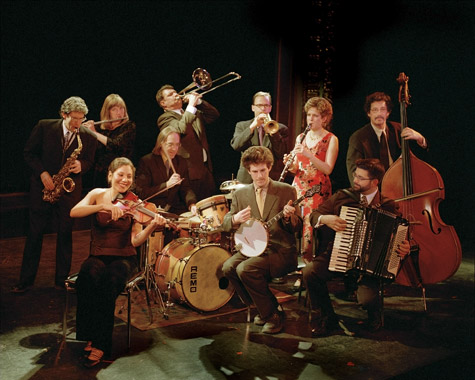
NEC's Klezmer Conservatory Band featuring founder Hankus Netsky (far left). PHOTO: Kathy Chapman |
READ: "Jew Note,"
First Annual Boston Jewish Music Festival, plus the Klezmatics, by Jon Garelick |
Hankus Netsky founded the Klezmer Conservatory Band 30 years ago at New England Conservatory and sparked an American klezmer revival that continues to this day. The KCB's myriad activities these days include serving as the back-up band for violinist Itzhak Perlman's touring klezmer-oriented projects (for which Netsky is the musical director), and it's alumnae include Don Byron and the Klezmatics' Frank London. Netsky — who now chairs the Contemporary Improvisation department at NEC — spoke with me about, among other things, the band's upcoming 30th anniversary concert at Berklee (March 6), the Boston Jewish Music Festival, Israel, Jewishness, and the history of klezmer.
HOW DID THE KLEZMER CONSERVATORY BAND START? WAS IT A STUDENT BAND, AND ARE STUDENTS STILL PART OF IT? Thirty years ago the band was a radical idea. Because basically the tradition was buried. The Jewish community had taken a sharp right turn, kind of lockstepped into basically starting over, with no trace of Eastern Europe in the culture. The whole Jewish education system was like that and in many ways still is. So, 30 years ago it was students.
At first it was too radical for the Conservatory too — they didn't really embrace it. So it became a professional band within months of starting. Basically because the school said, "Well, you know, you can do that but not as part of the curriculum." But a year later they totally changed their minds and said, "Hey, you know what? Maybe that's a good idea." I think that was because we got a record deal with Vanguard right away and were Prairie Home Companion right away and were playing the Philly folk festival. So they were like, "Hey, wait a minute!" And they started really embracing it. So it's been really interesting.
But the current band, I'd have to say the most recent graduate in the band is our fiddler [Yaeko Miranda-Elmaleh], who graduated about six or seven years ago, probably the same class as [banjo player] Brandon Seabrook. They're probably the youngest members. They became part of the band after they graduated just because we happened to have those two vacancies. It's mostly still NEC grads. It's currently an 11-piece group and still mostly graduates. And of course the concert on the 6th will feature Judy Bressler and Don Byron, two more NEC grads. It's funny, NEC was the force that empowered me to do it, but extracurricularly. Our first concert was a student-sponsored concert at NEC, not an administratively sponsored concert. So they didn't even know what they were creating by allowing a Jewish music concert at NEC.
The school had had a very checkered history in terms of things like Jewish faculty members; in the old days they were very exclusive. They actually publicly embraced their African-American students but not the Jewish ones. Harry Ellis Dickson would always talk to me about that. He'd say, "This is amazing you actually got the school to be identified with Jewish music." At one point in the 1920s they wouldn't print the names of their Jewish faculty members in their catalogue. I brought a recording of our first concert to a woman who by that time was bedridden — she had resigned because they wouldn't print her name in the catalogue.